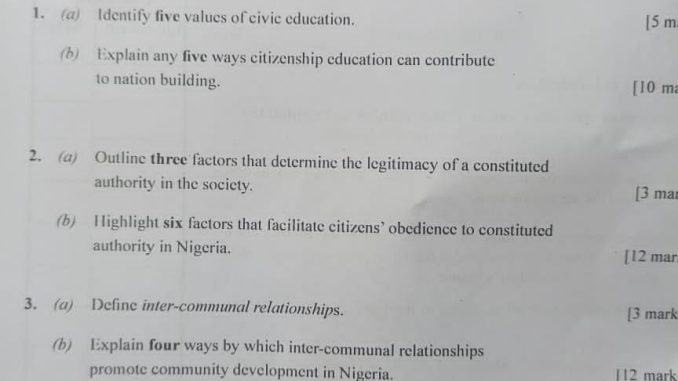
CLICK HERE TO REFRESH UR PAGE
OBJ LOADING…….
CIVIC-OBJ
1-10: ACCABADDCD
11-20: CADBADABCD
21-30: DADADCCADB
31-40: AADDACCDBB
41-50: BDCBCDDAAD
COMPLETED
WAEC 2023 CIVIC EDUCATION
(1a)
(i)Values help to determine and control the behavior of individuals in the society.
(ii)They act as criteria or measures for the judgment of the actions of individuals in the society.
(iii)They give focus and direction to individuals in the family and society at large.
(iv)They help us in decision-making.
(v)They modify our attitudes and feelings toward other people through tolerance of different opinions and behavior.
(1b)
(i)Nationhood and identity: Citizenship education helps individuals develop a sense of national identity, fostering a shared understanding of values, history, and cultural heritage. It strengthens the bond between citizens and their nation.
(ii)Active citizenship: Civic education empowers individuals to actively participate in civic life, including community development projects, volunteer work, and public service. It encourages citizens to take ownership of their communities and contribute to their improvement.
(iii)Democratic governance: Citizenship education promotes an understanding of democratic principles, processes, and institutions. It equips individuals with knowledge about their rights and responsibilities as citizens, preparing them to engage in democratic decision-making and hold elected representatives accountable.
(iv)Social responsibility: Civic education instills a sense of social responsibility, emphasizing the importance of contributing positively to society. It encourages citizens to be aware of societal issues, such as poverty, inequality.
(v)Peaceful coexistence: Citizenship education promotes respect, understanding, and dialogue among individuals from different backgrounds. It equips citizens with skills to resolve conflicts peacefully.
(3a)
Inter-communal relationships refer to the interactions, connections, and bonds between different communities or ethnic groups within a specific geographical area. It involves the social, cultural, economic, and political interactions that occur among individuals, families, organizations, and institutions from different communities.
(3b)
(i)Cultural Exchange and Diversity: Inter-communal relationships provide opportunities for cultural exchange and appreciation. When different communities interact, they share their customs, traditions, languages, arts, and values.
(ii)Peace and Conflict Resolution: Effective inter-communal relationships contribute to peaceful coexistence and conflict resolution. When communities establish open lines of communication and engage in dialogue, it becomes easier to address misunderstandings, resolve disputes.
(iii)Economic Collaboration: Inter-communal relationships can enhance economic development in Nigeria. Communities that collaborate and engage in trade, business partnerships, and resource sharing create economic opportunities and increase productivity.
(iv)Social Integration and Unity: Inter-communal relationships foster social integration and unity among diverse groups. When different communities interact positively, stereotypes and prejudices can be challenged and overcome.
======
(7)
(i) Policy Development and Implementation: Public servants play a crucial role in developing policies and strategies to address societal issues and achieve national goals. They research, analyze, and make recommendations to policymakers, and then implement approved policies, monitoring their progress and making adjustments as needed.
(ii) Service Delivery: Public servants are responsible for delivering public services to citizens. This includes providing healthcare, education, transportation, infrastructure development, social welfare programs, and more. They work to ensure these services are accessible, efficient, and of high quality.
(iii) Regulation and Compliance: Public servants enforce regulations and ensure compliance with laws and standards. They oversee sectors such as finance, commerce, health, and the environment, developing and implementing regulations, conducting inspections, and taking enforcement actions when necessary.
(iv) Budgeting and Financial Management: Public servants are involved in the formulation and execution of government budgets. They prepare budget proposals, allocate funds to different sectors, monitor expenditures, and ensure financial accountability and transparency.
(v) Human Resource Management: Public servants are responsible for managing the government’s workforce. They recruit, hire, train, and evaluate employees, promote merit-based appointments, and develop policies for staff welfare, performance management, and career advancement.
(6a)
(i)Violence and Criminal Activities: Cultism often involves the use of violence, intimidation, and criminal activities such as robbery, kidnapping, drug trafficking, and extortion.
(ii)Loss of Lives and Property: Cult clashes and rivalries can result in frequent clashes between different cult groups, leading to loss of lives and destruction of property.
(iii)Breakdown of Law and Order: Cultism undermines the rule of law by creating a parallel system of authority and justice.
(iv)Social Instability: Cult activities can disrupt social harmony and stability within communities.
(v)Cult Recruitment and Exploitation: Cults often employ deceptive tactics to recruit vulnerable individuals, particularly young people.
(vi)Erosion of Ethical Values: Cults often promote ideologies that contradict societal norms and ethical values.
(6b)
(i)High levels of poverty, unemployment, and inequality create an environment where vulnerable individuals are more likely to be recruited into cults.
(ii)Inadequate resources, corruption, and a lack of proper training and coordination among law enforcement agencies can hamper their ability to effectively combat cult activities.
(iii)One significant hindrance to eradicating cultism in Nigeria is the lack of effective law enforcement.
BONUS
(4a)
(i)National Drug Law Enforcement Agency (NDLEA)
(ii)Nigeria Customs Service (NCS)
(iii)Nigeria Police Force (NPF)
(4b)
(i)Worsening of health condition: Non-adherence to medical advice can lead to a worsening of the patient’s health condition, which can lead to complications and even death.
(ii)Spread of infectious diseases: Non-adherence to medical advice can increase the spread of infectious diseases, as patients who fail to follow treatment protocols may continue to infect others.
(iii)Development of drug resistance: Non-adherence to medical advice can lead to the development of drug resistance, which can make it more difficult to treat certain diseases and infections.
(iv)Increased healthcare costs: Non-adherence to medical advice can lead to increased healthcare costs, as patients may require additional treatments or hospitalizations due to their failure to follow treatment protocols.
(v)Reduced productivity: Non-adherence to medical advice can reduce the productivity of the patient, as they may be unable to work or carry out their daily activities due to their health condition.
(vi)Negative impact on public health: Non-adherence to medical advice can have a negative impact on public health, as it can lead to the spread of infectious diseases and other health conditions, which can affect the wider community.
THEORY COMPLETED…….
CLICK HERE TO REFRESH MORE ANSWERS
==========

Leave a Reply